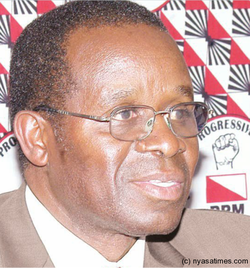 There are many things people don't know about my dad. The first thing you should know about him is that he's actually very uncomfortable with public speaking. If you see him speak at a public forum, know that he is operating outside his comfort zone. My dad's comfort zone is thinking. He is brilliant at looking at a situation and coming up with a completely new solution to it. He would never say it but he went from village boy to one of Malawi's first independent millionaires in an environment where the government hated his family. So much so that in his initial years of business until 1994 he operated as Mark Phiri (Phiri being his tribe name) rather than as Mark Katsonga (his actual surname) for fear that the government may persecute him for being his father's son. His father was a former political activist. Anyhow, on many occasions the University of Malawi invited him to speak to students to tell his story but he always refused because the idea of public speaking just made him uncomfortable. Personally, I think he doesn't even realize how brilliant he really is and that added to his discomfort. I am as enthralled by my dad's brilliance as the next person so in July 2010 as we took a long drive to Neno village with my then boyfriend Harry I asked him to tell me his story. Harry was sat in front with the driver, I was sat in the back seat with my dad. I forgot about these recordings until today but I am so glad I have them. The great relationship we have really comes through and I am uploading these recordings as much for myself as for everyone else; I know I will relisten to them again and again if they are online. In life, money comes and goes but no one can take away past achievements or the life experiences that have made you, you! Episode 1 (roughly 45 minutes)From the very beginning of our chat you can tell that my dad starts off feeling uncomfortable at the thought that this recording will be publicised. I lie to him that I won't record and he instantly chills out. Early years to Police Business 1 (aged 11) - Kachasu - a business ran with his mum and siblings. Business 2 (aged 12/13) - Zitumbuwa - his first independent business. Business 3 (aged 14/16) - vegetable growing and selling - his second independent business. Episode 2 (Roughly 50 Minutes)His years in the police, at SoBo company and his decision to go Zimbabwe for further education. Dad's brief stint as a houseboy (about 2/3 months). Basically, my dad was walking about with a friend and his friend saw a job ad for police recruits. He asked my dad to accompany him to inquire about the job. When they entered the police station the officer on duty laughed at the guy and said he was too short but that his friend (my dad) looked about the right height. My dad had no ambitions to be in the police but when he told his family about the opportunity they essentially forced him to do it because he needed a job. He decided he would do it for 6 months before moving on but on his first day he discovered that as soon as he was sworn in he was committed for four years. After lunch he pretended to be sick to buy himself time - that cracked me up. It bought him a month of time because the ceremony was only held once a month on the 5th of the month. His uncle gave him a right bollocking for messing about so he went to the village to tell his mum so she could back his decision not to join. Unfortunately, he told her the story in front of another villager who said - "Ntchito imeneyo ndi yabwino, posachedwa pano akhala kopulo" (That's a great job, very soon he'll be a corporal). His mother was sold. My dad cried tears as he felt sorry for himself! Saving In this episode he also reveals what an astute saver he was. He received 18 kwacha per month in the police: Mwk5 was spent on foods that don't rot (sugar etc.), Mwk5 was sent to his mum in the village to help her with household items, Mwk5 was banked to fund the education of his siblings and Mwk3 was his pocket money. Over the four years in the police his salary grew to Mwk4. He says some of his fellow police officers would borrow so much money through salary advances that at the end of some months their salary was negative but he stayed disciplined. He did not go to the staff tuck shop even once in four years. Business He still had the business bug and was operating a fruit business as a sideline whilst he was a policeman although that was not allowed. He got caught a mere 6 months before 4 years was up and was punished by being made to become a uniformed police officer after being in his civilian clothing for a long time. It didn't sit well with him and added to his reasons not to renew his contract with the police a few months later. I say it was fate. Houseboy For about a period of 3 months my dad worked as houseboy for a white man for a salary of Gbp3 - about Mwk6. Salesman Dad became a salesman for SoBo after leaving the police. From a salary of Mwk24 he started earning Mwk56 then Mwk65 once he was confirmed plus sales commission. He would earn over Mwk200 in some months because he was so good at selling. At around the time he had about Mwk2,000 in savings an incident occurred where he was being forced to go to work in Chikwawa but he didn't want to go there because he had contracted Malaria on a recent stint there to the point of being hospitalized. He quit the job. Episode 3 (Roughly 35 Minutes)Living in Zimbabwe including visa issues faced in Zimbabwe and working for Unilever. My dad decided to realize his life-long ambition of furthering his education. He bought a one-way ticket to Zimbabwe for Mwk39. On arrival, a kind Malawian stranger that he had met on the flight allowed him to stay with him for the night. When he got to his college he was shocked by the living conditions. Four men shared a room and slept on mats (mphasa) with limited amenities. Now that he had worked for a while and had lived better than this throughout his time in the police and as a salesman it just felt horrid but it was all he could afford. As fate had it he had the address of an uncle in Zimbabwe - the man had married his mother's youngest sister but they had never met before. He visited him very early one morning (before 7 a.m.) to introduce himself. After he told his uncle where he was staying and his uncle told him it wasn't a good place; he instructed him to collect his luggage and come to live with him. His uncle wasn't rich either; in fact he had to share his room with my dad to accommodate him. His wife was stuck in Malawi at this time so he was essentially just living with his daughter. Living with his uncle allowed my dad to take even more courses at his college because he saved money by not having to pay his uncle rent. Race Relations Relations between whites and blacks in Zimbabwe were not as friendly as they were in Malawi. My dad went to Zim on a tourist visa and after 3 months had a lot of trouble with the Zimbabwean authorities. Ultimately, they gave him a "stupor" which basically required him NOT to live in any Zimbabwean town; he was relegated to the village... From unilever to his tailoring business which he sold for a healthy profit to his candle business (Candlex) that led to his name becoming a household name. Dad returned from Zimbabwe in the late 1970s with his diplomas and secured a job at Lever Brothers, now Unilever. Whilst there, after work he ran a business called "International Trade Contact" in which he got the contact details of various suppliers and enabled people to fulfill purchase orders. After that in 1981 he started a tailoring business. He invested Mwk1,500 in the business and hired a tailor to sew and someone he knew to run the operations/sales. He later discovered that the competition was extremely stiff so 1981 and 1982 were very tough for the business. By 1982 the business had assets of Mwk5,000 and loans of Mwk12,000. He decided to sell up. After putting an ad in the paper he was surprised to get 12 offers, he hadn't expected to get any. Incidentally, because the Government had reserved tailoring businesses for Malawians there was huge demand from Indians for tailoring businesses that had licenses. My father didn't have one and the process for getting one was long and painful. Ultimately, though he sold the business for Mwk25,786 plus Mwk4,000 for the working capital. That bid of Mwk25,786 had been on the table for 2 months before he finally got the license and the bidder was losing patience - there quite a few sleepless nights. The day they drove to get the business license from Lilongwe my dad said he felt like it was pure gold. It was approved by Mr Malange, now my cousin's Grandpa but this was well before that happened. After his auditors had paid all creditors (and themselves) he had Mwk18,000. He used Usd4,500 to buy a candle machine from Japan. This was a time when Malawi kwacha was still pegged to the pound and was much more valuable than Usd. Usd4,500 was about Mwk3,000. What happened next was pure magic. In 6 months of launching the candle business he had Mwk150,000 - we're not talking turnover here, we're saying saved up! Quite shocking when you consider that each candle was selling for just 10 tambala each and cost 4 tambala to produce. Keep in mind this is still 1983 - basically, when little Heather was born in November of that year business was booming, the sleepless nights were a thing of the past. How he went from struggling with the tailoring business to being so cash rich you'll have to listen to find out. Episode 4 (Roughly 60 Minutes)Episode 5 (Roughly 30 Minutes)The early years of Candlex continued. In this episode I ask my dad how he came up with the name Candlex and I also want to know why he didn't buy a Mercedes Benz the moment he was cash rich. This is the modus operandi of literally every guy I know who sniffs the littlest bit of cash. By the end of 1983 he had the funds to afford a Mercedes but he kept his little Datsun and didn't get a "flashy" car until 8 years of good business later in 1990. SummarySome people immediately will immediately say, he was lucky. To a certain degree, yes, he was, but the luck was generated by his own actions. In the first episode you will note that my dad's friends were mostly playing when he was 11 but he was helping with his mum's business. Throughout the story you will notice that there are two things completely absent: drinking and football. I have never seen my dad watch sport. As he said in his story after work he was always researching the next thing or working on a business. It took 20 years of practice before he got his lucky break. How long have you been practicing?
7 Comments
 This piece is a response to the blog, The End Of Men & The Disilliusionment Of Women by one Dango Mkandawire, my little sister’s friend. First and foremost, I would like to remark that I am proud that he has so eloquently expressed his thoughts – the piece is not only well written it is also quite balanced. The corner stone of the piece is relayed through an experience that Dango had. Whilst he was in attendance at a funeral a friend of his was presented with a bill and although his salary could not realistically meet the obligation it was the feeling that he would have to “man up” and pay. The moment was more remarkable to Dango in that he knew his friend’s sister was better paid but was not expected to make a contribution. As Dango has so carefully given his story context, I feel I should do the same before I go into a bit of a counter-argument. I am in full acknowledgement that my family experience is the exception rather than the rule. My father is a businessman and whilst he had been doing business in one form or another from about the age of six, his “formal” business career began after he saved enough money to send himself to a business school in Zimbabwe. He did a series of diplomas related to business, marketing, sales and commerce then returned to Malawi to start business. My mother, on the other hand, went to university and completed a traditional degree. She started off as a low-ranking civil servant and worked her way all the way to the top of the organisation over a career spanning three decades. In 1999 she even got the opportunity to complete a Masters degree in Fiscal Economics. Today she is the Head of Customs in Malawi and also the Vice Chairman (VC) of the World Customs Organisation (WCO) for East and Southern Africa (ESA). To say I am proud of her achievements would be the understatement of 2014. Now, the family situation: yes, up until I was about 15/16 my father was the clear breadwinner. He earned a lot more than my mother and covered all the domestic bills. We had owned our own house since I was about 5 or 6 years old so there was no rent to pay. My father had a mortgage and cleared it within a few years. Fortunately, like most families that live in towns in Malawi we had a cook and a maid but my mother still cooked at times. She also cleaned the marital bedroom and washed my father’s “intimate” clothing. Whatever spare cash she had was selflessly spent on the kids. In addition to the day job she had a side-line income from selling clothes. My father was not the type to subjugate a woman so my mother had the freedom to attend cocktail dinners and other events on her own. Nonetheless, if there is one lesson my mother emphasised as I grew up it was, never depend on a man; you must always have your own income so that you have a say in affairs of the household.  With this perspective I went into my marriage expecting to pay 50-50. As I am the economist and my husband a doctor I calculated our monthly expenditures and suggested we both pay £x into the joint account from which all our bills are taken. We started doing this when we started living together – 14 months before my husband proposed and 20 months before we got married. Now you have a solid foundation let’s discuss Dango’s seminal conclusion: “In our social evolution, women have been granted the right to earn as well as men but the obligation to provide has not necessarily passed.” There is one gaping hole in the discussion. He forgets to mention where the women were at this funeral. I too recently attended a funeral in Malawi and I too made the observation that things have not changed. The men were kept separate from the women; the “top-ranking” men were sat in sofas and the women, regardless of status, were either relegated to the kitchen or were sitting on the floor. Some of the boys sat in the sofas were half my mother’s age but as their high-ranking fathers were comfortably sat on a sofa they too felt entitled to do the same. Basically, society was saying to my mother, I know you are the Head of Customs and VC of WCO for ESA but take your Masters Degree in Fiscal Economics and cook the men some food. How is this just or fair, I ask? Yes, we have caught up in income but you still expect women to take on an unequal burden of childcare and household chores. Just because I push the baby out does not mean I have to change all the nappies and do all the bathing. If Dango's friend had taken to the kitchen and asked his sister to make a contribution to the bill she likely would have agreed but what man would? Dango's friend was both too proud to say he cannot pay the whole bill and too proud to ask his sister to help out. If he had been less proud he would have openly said, “Makosana, gentlemen, my monthly salary is x, I have monthly bills amounting to y and over the last few months I have managed to save z. Consequently, the most I can contribute is a.” No one could have realistically argued with that. At all social events – wedding, funerals and other celebrations – women take on 100% of the catering burden. To ask those same women to also contribute to the bills is a double standard when we don't ask men to help out in the kitchen. I will know Malawi has reached true gender equality when I see men helping in the kitchen at such events. The mere suggestions of such a thing would be met with gasps and disbelief. So, I say to you my countrymen, if despite our progress in education and income you still expect us, the women, to take on an unequal and unfair burden of domestic affairs, don’t begrudge us our pocket money. Indeed, if you are too proud to have a discussion on how the domestic bills will be shared and are in turn unwilling to take on 50% of domestic affairs then perhaps the status quo is as it should be. Concluding Thoughts (added 21-Apr-14) Women work two-thirds of the world’s working hours, produce half of the world’s food, yet earn only 10% of the world’s income and own less than 1% of the world’s property. I would suggest the following steps towards change:
I know friends who leave 100% of the cooking to their husband and they do all their cleaning. I have friends who give all housework to a third-party (cleaner) and eat out almost daily. This is what works for their relationship. I have a friend who's husband does all the baby baths because she does all the feeding. Different relationship will end up with different solutions but both parties should be happier by an outcome that has been discussed than a defacto status quo. I have quite a few friends that would prefer their husbands did more but they do nothing about it. Once personal relationships are more equal then community-wide equality can be more easily discussed.
 When I first arrived at my boarding school I was three weeks late because I had started off at another school before my parents decided they preferred this one. To cut a long story short, friends had been made and penetrating the existing cliques was a task I could not be bothered with. Being in the middle of nowhere I set myself up with a rigorous study schedule (for an 11 year-old) which resulted in me reading and doing homework for at least four hours every single day from the beginning of term. From a marketing perspective, what does this mean? If you create a brand that has multi-level sensory appeal, that is, it has a look, a feel, a smell, a tag-line or even a jingle, even when one or several of those elements are absent people are reminded of your brand. And if they like it, they want it. A McDonald’s fanatic merely has to hear the McDonald’s whistle to start craving a Big Mac. The theory of neuroplasticity is not limited to marketing - reading between the lines I realised that it applies to learning things in general. For instance, when I first went to high school in 1995 I found school a bit of a challenge. I wasn't failing, far from it, but I was a borderline B/A student. I am currently re-reading Brainfluence by Roger Dooley. It is hands-down the best neuro-marketing book I have ever read and all other books simply don't math up. Anyway, on a second read or watch of something you always learn something new and on this occasion one theory really caught my attention. The theory is technically called "neuroplasticity" and was first proposed by Sigmund Freud then was later elaborated upon by a Canadian psychologist called Donald Hebb; it was finally summarised in six words by the neuroscientist Carla Shatz as: “Neurons that fire together wire together.” This theory just helped me understand some of the things I have observed in my life but never really understood. Lessons finished at 3pm and I was in the library 3.30 to 5.30pm as standard and then I went to dinner. Prep time was 6.30-8.30pm and I studied then too. I started doing homework during break time and lunch time so all four hours could be spent studying. At first I used to find recall a little challenging but the more I studied, the easier it got and the more I enjoyed it. With maths, I quickly learnt that when you practice the problems in preparation for an exam instead of just reading the solutions sets in the book you really came to understand the topic so that's what I did. I became so good at memorising that I didn't even realise the point at which I stopped memorising and started understanding things. It appeared that the more I knew the more I could relate seemingly unrelated topics especially in maths. By the time I got to university I didn't think learning was hard anymore - in fact - by comparison, I can say I found the University of Cambridge easier than high school! But this is where it gets interesting. Throughout my life I have taken an interest in being coached and having a mentor and I think this theory of neuroplasticity applies to coaching very well. I am not into feel-good motivational coaching that makes you feel good about yourself without any practical steps. Feeling good about myself is not something I have a problem with and the few times that I might have that issue, I can just call one of my doting younger sisters. When it comes to practical action-based coaching you learn so much information in such a short space of time and with that synaptic impulses must be flying all over the place in your brain. By being coached and learning from someone else's experience you cut the learning time and get to your goals a lot faster than if you had to make every mistake by yourself. Having all the knowledge sitting in your brain at the same time creates a multiplier effect. It’s a case of 1 + 1 = 3. A lot of people don't take much interest in coaching and learning once they leave the formal education system but I think those that do achieve a lot more, faster. The first step in educating yourself is in reading books that feed your brain. The next step is to either take courses with like-minded people or form voluntary groups and societies with people that you know you will learn from. In doing so you will achieve any goal, financial or otherwise, more rapidly than taking the trial and error route. "I never cease to be amazed at the power of the coaching process to draw out the skills or talent that was previously hidden within an individual, and which invariably finds a way to solve a problem previously thought unsolvable." John Russell For inspirational quotes follow @Getting2Wealthy on twitter.
 Check out Toia's Natural Hair Regimen Check out Toia's Natural Hair Regimen Making money via elance.com is tough if you live in a developed country because the cost of living is so high. Fact: people want to hire someone in the US or the UK because there are no language barriers and they generally expect a better quality finish; however, when they compare our rates to those of much cheaper and equally qualified people in Asia, they can't justify selecting a UK- or US-based person. I stumbled upon a guy who made almost $24k on elance in a month by analyzing it and coming up with a winning formula: Hacking Elance – The Step by Step Guide to How I Made $23,700 in 4 Weeks He's mixed race/black so it can't be said that it wouldn't work for a black person. I am very impressed by the fact that he really took time to analyze the platform and came up with his own winning formula before jumping in. The beauty of using videos to pitch is that people get to:
Any way, I only use elance to hire, if I ever want to make money via the platform I will definitely re-read Daniel DiPiazza's tips in Hacking Elance – The Step by Step Guide to How I Made $23,700 in 4 Weeks
|
Archives
December 2015
Categories
All
By Heather Katsonga-WoodwardI'm always thinking, debating, considering and revising my views - some of those deliberations will be shared right here. |





 RSS Feed
RSS Feed
